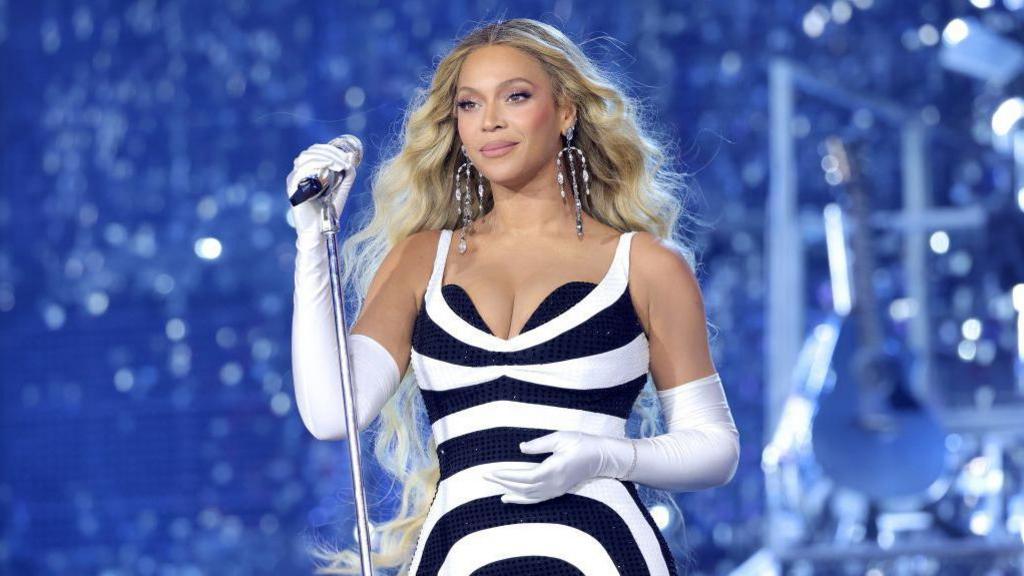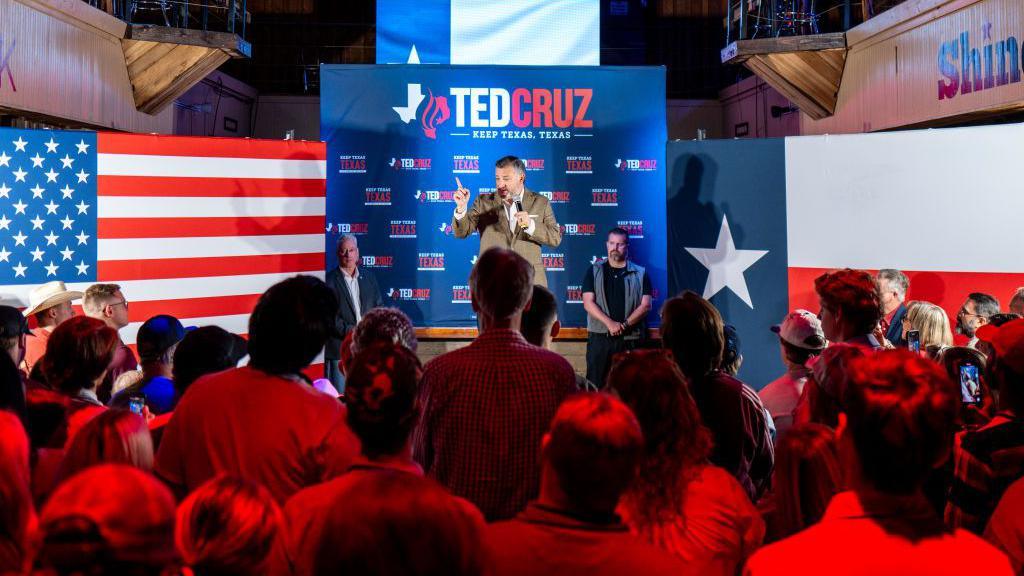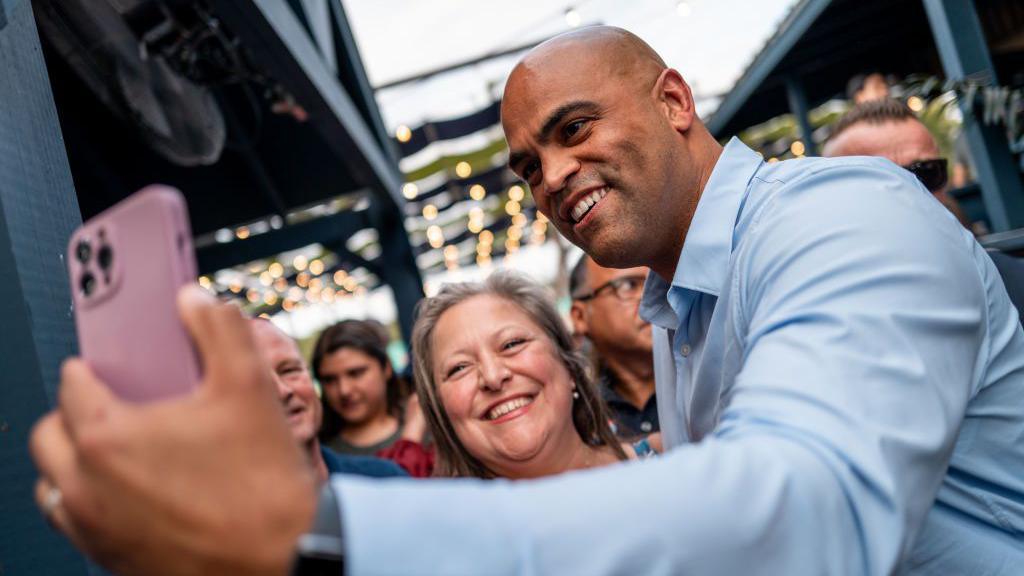Democrats bet big on Texas in hope of flipping Cruz's Senate seat

Pop star Beyoncé will be campaigning with Kamala Harris on Friday
- Published
As the 2024 election season approaches its final week, Democrats are in an uphill fight to retain control of the US Senate. The party is defending seats in close races across the country – and they have little if any margin for error.
Their slim hopes in the upper congressional chamber - gatekeeper for substantive legislation and responsible for confirming Supreme Court justices and senior presidential administration appointees - may hinge on their hopes of unseating Senator Ted Cruz in Texas.
Texas is certainly an unlikely place for Democrats to be placing their faith. A Democrat hasn’t won a contest there in three decades. The Lone Star State seems perennially just out of reach for Democrats, raising their hopes only to resoundingly dash them on election day.
The Texas government churns out a steady stream of right-wing policies on immigration, abortion, education and other hot-button cultural issues. The last Democratic presidential candidate to win there was Jimmy Carter in 1976.
Cruz is a two-term incumbent with a national network of support dating to his 2016 bid for the Republican presidential nomination. He won the Iowa caucuses that year with the backing of evangelical voters and went on to finish second behind Donald Trump.
The former corporate lawyer and Supreme Court clerk has built a reputation as a conservative firebrand in the Senate, pushing for government shutdowns to advance his political priorities and often engaging in heated exchanges in committee hearings and media appearances.
Despite all this, Democratic presidential candidate Kamala Harris is in Houston on Friday, holding a rally with the party’s Senate candidate, congressman Colin Allred.
US election polls: Who is ahead - Harris or Trump?
- Published5 November 2024
And for the first time this campaign, she will appear alongside pop star Beyoncé, who will perform at the city’s Major League Soccer stadium.
It’s a notable investment in precious time and resources just over a week from election day. Public opinion polls, however, show a tight race between Allred and Cruz – within the margin of error in some surveys and markedly closer than the contest between Harris and Donald Trump in the state.
Allred, a three-term congressman from the Dallas area, is a former NFL player and college football standout at Baylor University in Waco, Texas. He worked in the Obama administration before running for public office and is running as a political moderate.
Meanwhile Cruz, for all his political strengths, is not universally well liked even in conservative Texas. He defeated Democrat Beto O’Rourke by less than 3% when he ran for re-election in 2018.
And in 2021 he was criticised for travelling to Cancun, Mexico, while swathes of Texas had power outages due to a record-setting winter storm.
The matchup is enough to get Democratic hopes up – again.

Republican senator Ted Cruz is running for re-election in Texas
At the Cactus Jack Cagle Community Center in Spring, Texas, on Thursday afternoon, a steady stream of Texans turned out to vote early in the 5 November election. Many said they were supporting Trump and Cruz, primarily because of the economy and their views on limiting undocumented migration. Those backing Harris in this northern Houston suburb were cautiously optimistic, however.
“Cruz is wishy-washy,” said Leona Fuller. “He called Trump all kinds of names [in the 2016 presidential race], and now all of a sudden, he's pro-Trump. You can't do that and expect to lead people and be effective in your leadership.”
Floyd Guidry III, voting in his first election since turning 18, said he wrote a high school report on Allred’s policy proposals and was particularly drawn to his calls for criminal justice reform.
“It’s time for change,” Floyd’s father, who came with him to vote, said. “It doesn’t matter if you’re a Republican or a Democrat."
Many political experts, however, have their doubts.
Miles Coleman, associate editor of Sabato’s Crystal Ball at the University of Virginia’s Center for Politics, has the race rated at “likely Republican”.
“Texas is going to be a toss-up state one day,” he said, citing demographic shifts as the state becomes younger and more diverse. “But I don’t see it happening for Democrats this year.”
If the Democrats want to hold control of the Senate, however, the opportunities to do so are few and far between.
They currently hold 51 seats in the 100-person chamber. If they win the presidency (a big if) they can only afford to lose one seat. If Trump wins, any net loss for the party will deliver the chamber to Republicans, with Vice-President JD Vance providing a tie-breaking vote.
The map for Democrats this year is bleak.
Thirty-four of the chamber’s 100 senators, who serve six-year terms, are up for election this year. Democrats are defending 23 seats – in part the result of the party’s overperformance in 2018 and 2012.
In three of those states – Ohio, Montana and West Virginia – Trump comfortably won in 2016 and 2020.
The West Virginia seat being vacated by centrist former Democrat Joe Manchin is a virtual lock to flip to the Republicans. In Montana, three-term incumbent Jon Tester has been trailing in the polls for months.
Five other Democratic-controlled seats are in states that are considered toss-ups in this year’s presidential race – Pennsylvania, Michigan, Wisconsin, Arizona and Nevada. In three of those states, Democratic incumbents are seeking re-election. In the other two, a new candidate is trying to replace an outgoing senator.
Meanwhile, most of the Republican-held seats on the ballot are in deeply conservative states like Mississippi, North Dakota and Wyoming. Only in Florida and Cruz’s Texas are Democrats anywhere near striking distance.

Colin Allred campaigning in San Antonio, Texas on 17 October
In another state, reliably conservative Nebraska, an independent candidate – Dan Osborn – is in a tight race with incumbent Republican Deb Fischer. It’s not certain, however, whether Osborn would vote to give the Democrats a functioning majority if he wins.
“Sometimes in safe states you get incumbents who get lazy,” Mr Coleman said. “Deb Fischer hasn’t had a tough race since she was first elected.”
Of greater concern for Democrats is the fact that only once in the past two presidential election years – in Maine in 2020 - has a state voted for a president from one party and a senator from the other.
If that trend away from ticket-splitting continues, said Mr Coleman, Democrats have little hope. It could explain why the party is dedicating more resources to incumbents in battleground states, rather than supporting challengers in Republican-friendly Texas and Florida.
This week alone, the Democratic Senate majority leader’s political action committee spent more than $15m (£11.5m) in advertising for the Ohio and Pennsylvania races. In Texas, it spent $60,000.
“If you look at how Democratic groups are spending their money,” said Mr Coleman, “they’re more interested in maximising the number of seats that they could hold after the election, rather than maximising their potential targets.”
The money the party has moved into Texas so far, he noted, is just a “drop in the bucket” in such a large state.
So then what are Harris – and Beyoncé – doing in Texas? According to Mr Coleman, it gives the Democrats a chance to place the national focus on to the state’s strict anti-abortion laws – an issue where polls show the party has a decided advantage over the Republicans.
And even if Allred doesn’t win, a strong showing against Cruz could help the state’s Democratic party build infrastructure that would allow them to be more competitive in the future.
That may not be what Texas Democrats longing for a win this year or party faithful looking to hold on to the Senate want to hear.
But it may be the cold, hard reality facing the party as election day approaches.

North America correspondent Anthony Zurcher makes sense of the race for the White House in his twice weekly US Election Unspun newsletter. Readers in the UK can sign up here. Those outside the UK can sign up here.

